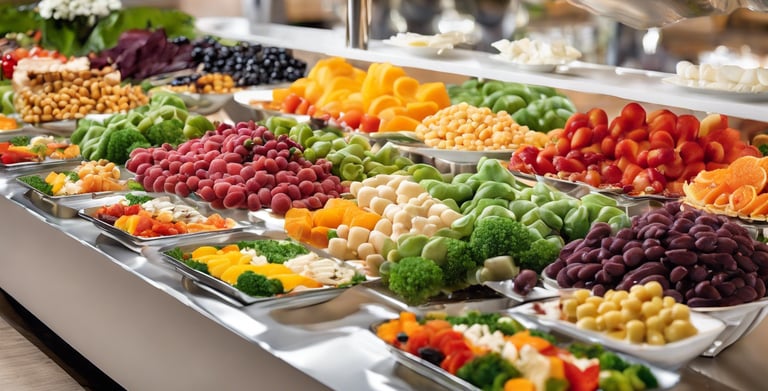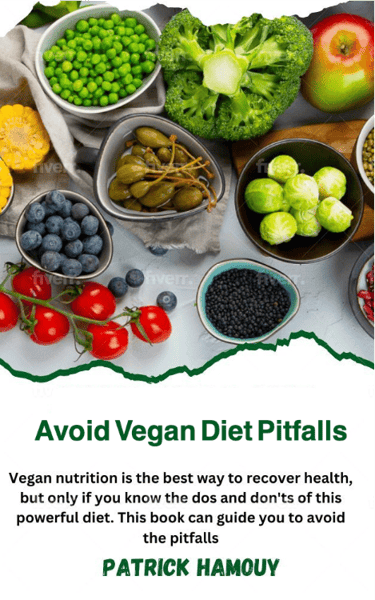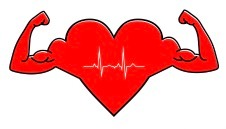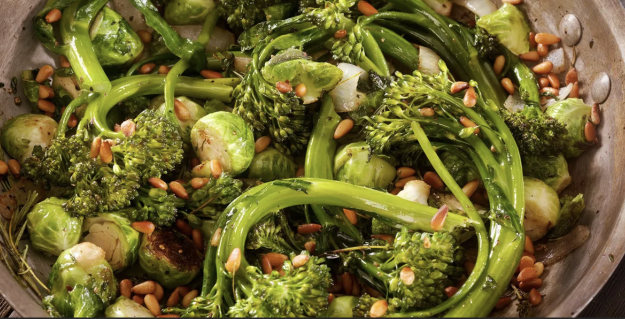Tomorrowhealthcare@runbox.com
Vegan Diet Benefits


Some more benefits of a vegan diet:
Higher content of dietary fibre
Folic acid
Vitamins C and E
Potassium
Magnesium
Many phytochemicals
Fat content that is more unsaturated
Less saturated fat and cholesterol
Vegans tend to be thinner, have lower serum cholesterol, and lower blood pressure, reducing their risk of heart disease. The vegan diet also protects against some cancers.
Switching to a vegan diet can have numerous benefits for both your health and the environment. Vegan diets are typically higher in fibre, vitamins, and antioxidants, which can lead to improved digestion, lower cholesterol levels, and a reduced risk of chronic diseases.
In addition, choosing plant-based foods over animal products can help decrease greenhouse gas emissions, conserve water, and reduce deforestation.
What Vegans may lack in their diet
The following is extracted from Patrick's Avoid Vegan Diet Pitfalls book (see below). Patrick's book includes many more examples.
Vegan eaters may lack the following vitamins, minerals and nutrients:
1- B12
You have probably heard that a problem with vegan eaters is that they are not getting enough vitamin B12, as this vitamin is found mainly in animal food.


When you buy a B12 supplement, please ensure it contains adenosylcobalamin and methylcobalamin. Any supplement that only has one of these is incomplete.
However, B12 can also be found in plant-based milk, such as almond milk, but this milk is high in fat, so you should drink only a little.
Quinoa is also a great source of vitamin B12. It is low in saturated fat and calories and high in fibre, vitamins, and minerals. Tempeh, shiitake mushrooms, seaweed, algae, nori, and chlorella are good sources of B12.
2- Iron
Non-heme iron, found in plant foods like fruits, vegetables, grains, and nuts, is absorbed less efficiently, so you should supplement it with vitamin C, which aids in absorbing non-heme iron.
Plant-based sources of iron include chickpeas, lentils, tofu, whole and enriched grain products, raisins, figs, pumpkin, sunflower, sesame seeds and broccoli.
3- Vitamin D3
If possible, try to get some sun on your skin daily. Start with 5 minutes the first day and increase gradually. Use monoi oil to protect your skin.
When exposed to the sun, fair-skinned individuals can produce up to 10,000 IU of the vitamin, while people with darker skin will make less.
Plant-based sources of vitamin D include fortified plant-based milk (almond milk), organic tofu and Shiitake mushrooms (cooked).
Find out what else may be lacking in your vegan diet in Patrick's book.
Further benefits of vegan diet
Cardiovascular benefits of vegan diet
Vegans eat a substantial number of fruits and vegetables rich in fibre, folic acid, antioxidants, and phytochemicals. The benefits include:
Lower blood cholesterol
Lower incidence of stroke and ischaemic heart disease
Vegan's higher consumption of whole grains, organic soy, and nuts also protects them from cardiac problems.


As mentioned above, vegans are leaner than carnivores. Obesity is a substantial factor in the creation of cancer, so vegans would, therefore, fare better.
A vegan diet that is high in fruits, vegetables, and legumes offers some protection against cancer.
Scholar Winston J Craig adds, "Fruit and vegetables contain a complex mixture of phytochemicals that possess potent antioxidant and antiproliferative activity and show additive and synergistic effects. The phytochemicals interfere with several cellular processes involved in the progression of cancer."


Modern treatments are unlikely to succeed as the causes of the cancer have not been addressed.
Cancer
Many more benefits of vegan diet
A few days before my forty-first birthday, I was diagnosed with liver and large intestine cancer in 1991. The internet and other literature I could find did not make me optimistic about my chances of recovery with modern medicine. A friend who had recovered her health with a strict macrobiotic diet convinced me to change my diet. I did so immediately, eventually loosening the macrobiotic diet's restrictions to a vegan diet.
I have been on this vegan diet ever since, and apart from a broken bone in my right hand and a nasty cut on my right ankle, I have not needed medical help since my diagnosis.
I am grateful for the benefits of the vegan diet; it has saved my life.
You CANNOT lack protein if you eat Vegan food


My study of Macrobiotics has taught me that:
"Cancers feed on protein and grow on sugar".
"You cannot lack protein as long as you eat".
I have not eaten any meat myself since being diagnosed with cancer in 1991. I sometimes eat a little fish but do not eat beef, pork, chicken, other poultry, or wild animals. I am now 73 years old and do not suffer from any ailments. I can walk and even run.
Meat protein is difficult to absorb
We must learn that we absorb more than just protein from meat. For our body to create protein from meat, it must first break the animal protein into amino acids and then manufacture human protein with these. This procedure is very tiring on the body and highly inefficient.
Observing wild animals such as zebras, giraffes, elephants, etc., we realise that they do not get their protein from animal food but from plants. They know the great benefits of a vegan diet.
The plants they eat. There is ample protein in vegetables and fruits, and you will not suffer ill health from a lack of protein if you stop eating animal food.
Linda Lazarides confirmed this in her book “Amino Acid Report.” It verified that most complex carbohydrates found in grains, potatoes, or beans have an amino acid content perfectly suitable for our protein requirements.
What to do?
As seen from all the above, "meat dangers are genuine". Should you have cancer, I strongly advise you to give it up.
Should you be unwell and have borderline cancer, I recommend removing this food from your diet.

